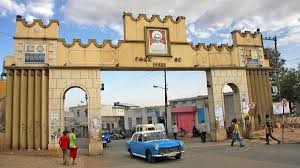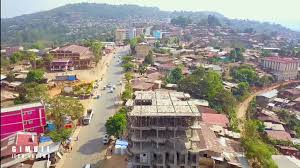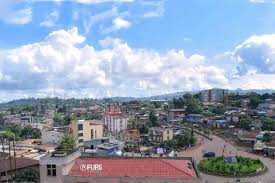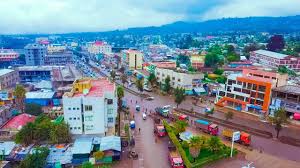Harar is one of those cities that feels like a hidden treasure in Ethiopia. With its colorful walls, unique culture, and a history stretching back centuries, it’s an incredible place that’s definitely worth exploring. Harar is nestled in the eastern part of Ethiopia and is surrounded by the Oromia region. It’s one of the oldest cities in the country and holds a deep significance in Ethiopian history, particularly because of its connection to Islam and its unique mix of cultures.
A Little Background on Harar’s Rich History
Harar is one of the oldest Islamic cities in Africa, often called the “City of Saints” for its dozens of shrines, mosques, and religious sites. Established around the 7th century, the city quickly became a center for trade, religion, and scholarship. People traded spices, textiles, coffee, and other goods, making Harar a hub of activity and culture.
What makes Harar especially fascinating is that it’s had a mix of cultural influences, blending Ethiopian, Arab, and Islamic traditions in its food, architecture, and daily life. This mix makes Harar feel different from any other Ethiopian city. Walking through Harar’s narrow, winding alleys, you can sense how much history and culture are packed into every corner of this old city.
Exploring the Walled City of Harar (Jugol)
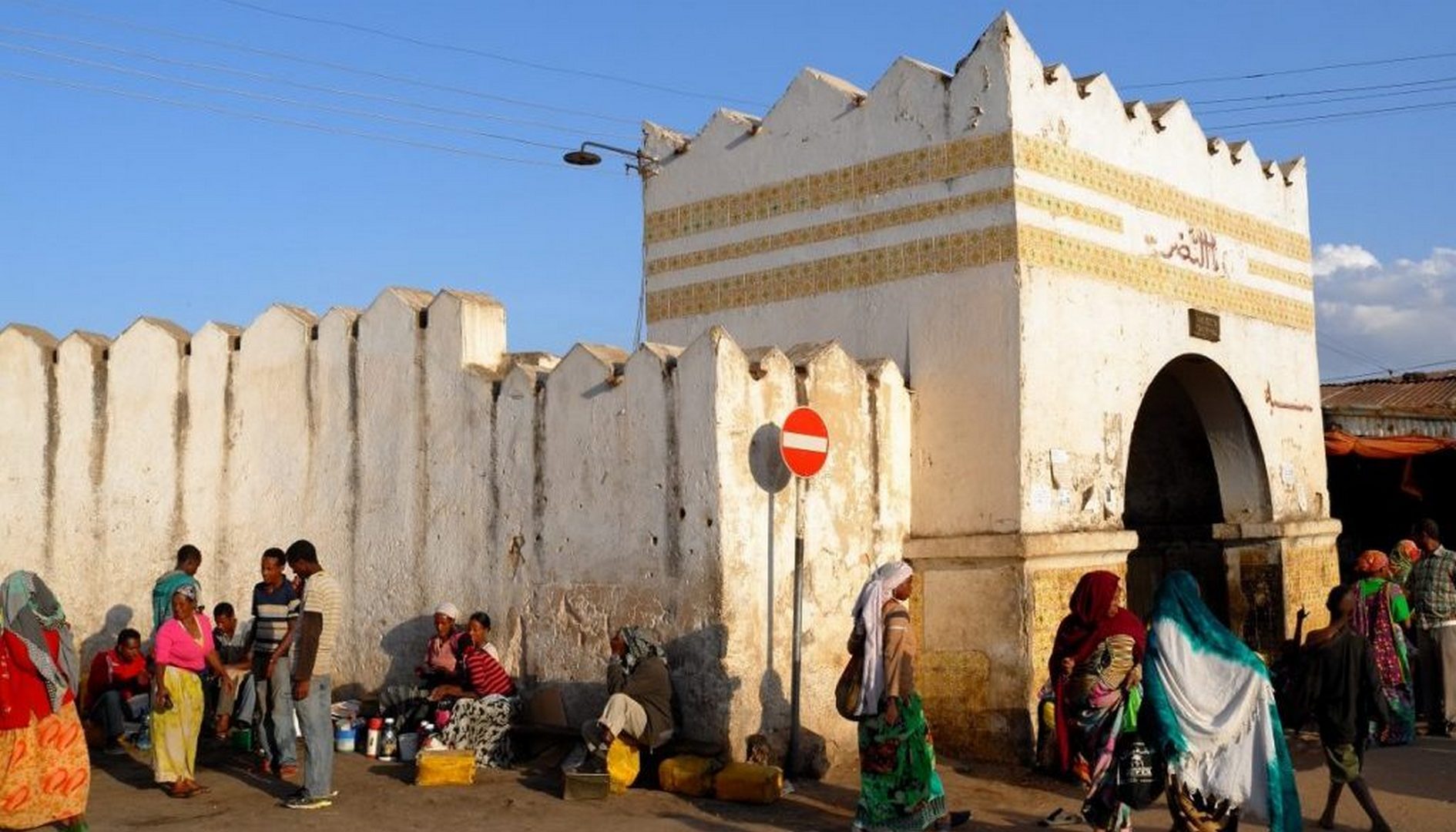
One of the first things that stands out about Harar is its walled city, known as Jugol. The walls were built in the 16th century by Emir Nur to protect the city from invasions, and they still stand today, adding a sense of mystique and charm to the city. There are five main gates leading into the old city, and once you step inside, it’s like stepping back in time.
Inside Jugol, you’ll find colorful homes, each painted in bright shades of blue, green, pink, and yellow. The walls and narrow pathways give the place an intimate feel, and the vibrant colors make it feel like a living canvas. The people here are friendly and welcoming, always open to sharing a bit of their culture with visitors. Just walking around Jugol, you can feel the heartbeat of Harar in the laughter of children, the clinking of coffee cups, and the casual conversations among neighbors.
The Harari People and Their Culture
The people of Harar, known as the Harari, are one of the most distinctive groups in Ethiopia. They have their own language, Harari (also called Adare), which is part of the Semitic language family. The Harari people have their own customs, clothing, and foods that set them apart from other Ethiopian groups, and they’re proud of their unique heritage.
One of the best parts of visiting Harar is getting to experience Harari hospitality. If you’re lucky enough to be invited into a Harari home, you’ll likely be treated to fresh coffee, traditional snacks, and lots of conversation. Harar has a strong coffee culture, and people here take their coffee seriously, often roasting and brewing it in a traditional ceremony that’s a feast for the senses. The coffee ceremony is an important part of Ethiopian culture, and Harar’s version has its own unique twist.
A Blend of Faith and Tradition
Harar is famous for its religious sites, as it’s considered the fourth holiest city in Islam. There are more than 80 mosques and about 100 shrines within the city walls. One of the most important is the Grand Mosque, which dates back to the 10th century. Visiting these sites gives you a deep appreciation for the city’s spiritual side and the role religion plays in everyday life here.
One of the unique features of Harar’s culture is the coexistence of Islam and traditional Ethiopian beliefs. You’ll see how these influences blend together in the art, music, and even the way people interact. It’s a city that’s open and accepting, with a culture of respect and understanding.
The Hyena Feeding Tradition

One of the most unusual (and unforgettable) experiences in Harar is the nightly hyena feeding. This is a tradition that’s been around for generations. Each night, local men, known as “hyena men,” call the wild hyenas down from the hills to feed them outside the city walls. This practice started as a way to keep the hyenas from attacking livestock, but it’s now become a unique bond between the people of Harar and these animals.
Visitors can watch, and even participate in the feeding. It’s quite a sight to see these wild animals up close and to watch the trust between the hyena men and the animals. For those brave enough, you can hold a stick with meat on it and feed the hyenas yourself! It’s an experience you won’t forget and one that shows the respect Hararis have for the animals that live around them.
A Coffee Lover’s Paradise
Ethiopia is the birthplace of coffee, and Harar has its own coffee variety known as Harar coffee. This coffee is famous for its fruity flavor and unique aroma. Coffee from this region is highly sought after, both in Ethiopia and around the world. In Harar, coffee is more than just a drink—it’s a part of social life. People gather over coffee, chat, and share stories.
The traditional coffee ceremony is a must-see. The beans are roasted over an open flame, ground by hand, and brewed in a clay pot called a “jebena.” The whole process is deeply rooted in Ethiopian hospitality and is a way of welcoming guests. If you’re a coffee lover, Harar is a dream come true. You can sample some of the best coffee while experiencing a tradition that’s been passed down for generations.
Shopping and Souvenirs in Harar

The markets in Harar are lively and filled with unique items. From handmade baskets to traditional jewelry, the local crafts are beautiful and reflect the culture of the city. One of the most popular souvenirs from Harar is woven basketry, known for its intricate designs and bright colors. You can also find spices, incense, and, of course, Harar coffee beans to take home.
If you’re exploring the markets, make sure to check out the stalls selling traditional Harari clothing. The clothes are colorful and often decorated with embroidery that reflects the city’s rich cultural heritage. These make great keepsakes and are a wonderful way to bring a bit of Harar back with you.
EthioAll: Bringing Digital Solutions to Harar
If you’re in Harar and looking to bring your business online, EthioAll is here to help. We specialize in web development, social media management, and solving issues with debit cards. Our team understands the unique needs of businesses in Ethiopia and can help you create an online presence that captures your brand’s spirit. Whether you’re a coffee shop wanting to attract more tourists or a local artisan selling handmade goods, we can set up an online platform that works for you. Reach out, and let’s work together to showcase Harar to the world!
Education and Universities in Harar
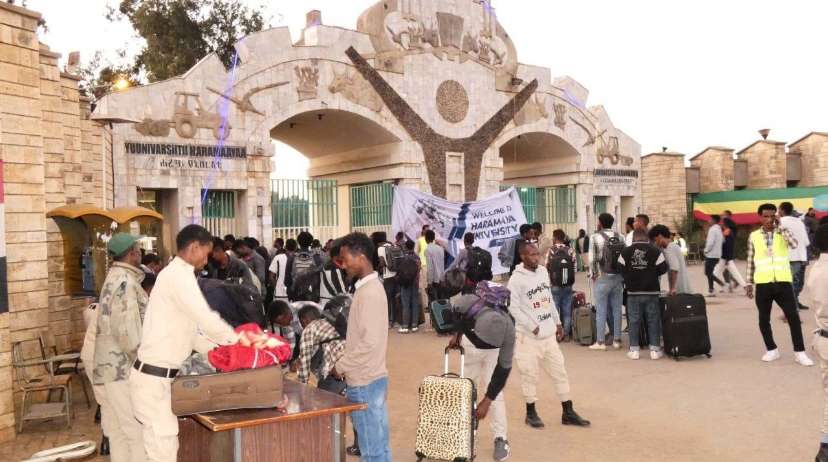
Harar isn’t just about history and culture; it’s also a place of learning and development. The city is home to Haramaya University, one of Ethiopia’s leading universities and a respected institution across Africa. Located about 20 kilometers from Harar, Haramaya University offers a range of programs, from agriculture to technology and health sciences. Established in the 1950s, the university has grown to become a key player in research, innovation, and education in Ethiopia, making it a popular choice for students from all over the country.
Haramaya University has a strong emphasis on agricultural studies, which makes sense given the surrounding fertile lands and Ethiopia’s reliance on agriculture. However, the university has expanded over the years to include programs in engineering, business, medicine, and social sciences. This expansion has turned it into a multidisciplinary institution, and it’s now contributing greatly to Ethiopia’s development by training future leaders and innovators.
Students in Harar and nearby areas benefit significantly from the university’s presence. It not only offers educational opportunities but also hosts various events, workshops, and conferences that are open to the community. These activities bring together students, academics, and locals, creating a vibrant intellectual scene in Harar.
Additional Key Spots in Harar
Harar Brewery
Founded in 1984, the Harar Brewery is one of Ethiopia’s largest breweries and an essential part of the city’s economy. It produces a popular beer that carries the name of the city, which is well-loved throughout Ethiopia. The brewery offers tours that allow visitors to see the brewing process and sample the product, making it a fun stop for those interested in local industry. The brewery provides jobs for locals, contributing to Harar’s economy and bringing in visitors interested in experiencing a different side of the city.
Museums and Cultural Centers
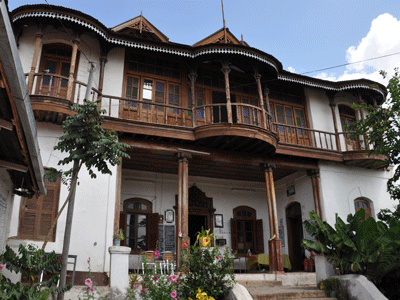
For those interested in learning more about Harar’s history, The Harar National Cultural Center and the Arthur Rimbaud Museum are must-visit sites. The cultural center showcases Harari artifacts, traditional clothing, and household items, giving a glimpse into daily life in the city throughout the ages. The Rimbaud Museum, named after the famous French poet who lived in Harar for a short time, is housed in a beautiful old building that’s worth seeing on its own. It highlights the city’s connection to the poet and displays items from his time in Harar.
Local Markets and Street Life
Harar’s markets are buzzing with life and color. The Shoa Gate Market and Gidir Magala are fantastic spots to experience local life up close. Here, you can find everything from spices and traditional clothes to coffee beans and fresh produce. Shopping in these markets is a unique experience, and you’ll find many handcrafted items and delicious street foods to try.
Harar’s street life is lively, with people often gathering to chat over coffee or play traditional board games. The street vendors sell items that reflect the cultural blend in the city—items that are Harari, Oromo, and even Somali. Spending time in these markets and on the streets gives you a real sense of the community vibe in Harar.
Harar’s Role in Community Development
Harar is not just about preserving culture but also about fostering growth and community. There are a number of organizations and NGOs working in and around Harar to promote education, healthcare, and community development. With Haramaya University leading the charge on research and community engagement projects, the area around Harar has become a model for sustainable development.
Initiatives focus on improving agricultural practices, public health, and women’s empowerment, which are all vital to the community’s progress. These projects don’t just support Harar but also provide resources and knowledge to surrounding rural areas. The blend of traditional culture with modern development efforts makes Harar a truly special place in Ethiopia
Festivals and Celebrations in Harar

Harar is known for its vibrant festivals, which bring the whole community together. One of the most important celebrations is the Ashura Festival, where the streets fill with music, dance, and religious processions. It’s an event where people from all over come together to celebrate, and it’s a fantastic way to see the city’s culture up close.
Another event that attracts attention is Eid al-Fitr, marking the end of Ramadan. Families gather, mosques are decorated, and the community comes together to share meals and enjoy the holiday. Visitors during these times get a firsthand look at the city’s deep-rooted traditions and sense of unity.
Harar’s Connection to the Surrounding Oromia Region
Harar’s location within the Oromia region means it has strong ties to Oromo culture. Many Oromo people live and work in Harar, and the two cultures blend together in everyday life. You’ll hear Oromo music, see traditional Oromo clothing, and taste Oromo dishes alongside Harari ones. This blend makes Harar a unique place where multiple cultures come together and add to the city’s diversity.
How to Get to Harar and What to Expect
Getting to Harar can be an adventure in itself. Most travelers take a flight to Dire Dawa and then make the drive to Harar, which takes about an hour. The road trip is scenic, with views of the countryside, small villages, and the occasional camel crossing the road.
Once you’re in Harar, be ready to explore on foot. The old city’s narrow streets aren’t made for cars, and walking around is the best way to soak in the sights and sounds. The town is very welcoming to visitors, and you’ll likely have people greeting you with a warm “Akkam Jirtuu” or “Salaam Alaikum” as you walk by.
Wrapping Up: Why You Should Visit Harar
Harar is more than just a historic city; it’s a place where culture, history, and everyday life come together in the most colorful way. Whether it’s sipping coffee in a Harari home, feeding the hyenas, or just getting lost in the winding streets of Jugol, there’s something magical about this place.
If you’re looking for an authentic experience in Ethiopia, away from the big tourist crowds, Harar is the perfect spot. It’s a place where you can slow down, enjoy the little things, and connect with people who have a deep love for their city. So, pack your bags, grab your camera, and get ready to explore one of Ethiopia’s most unique and welcoming cities. Harar is waiting for you!

